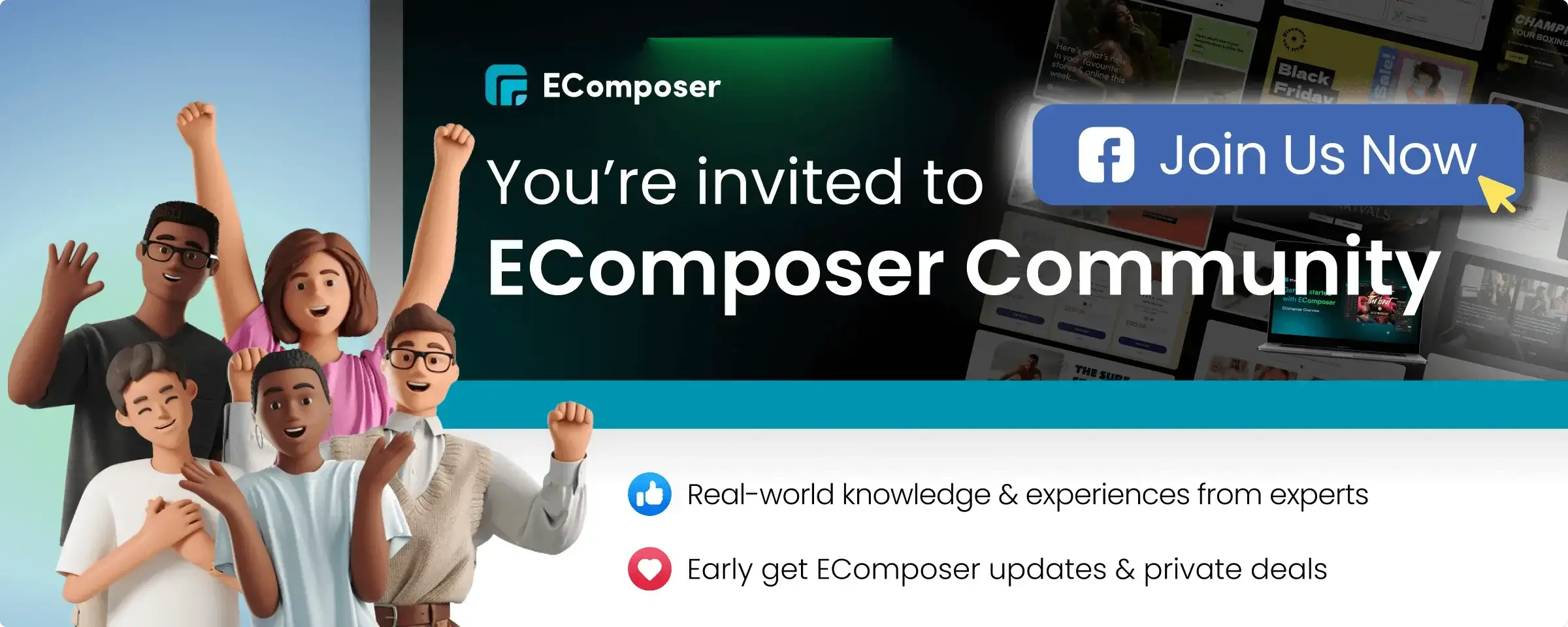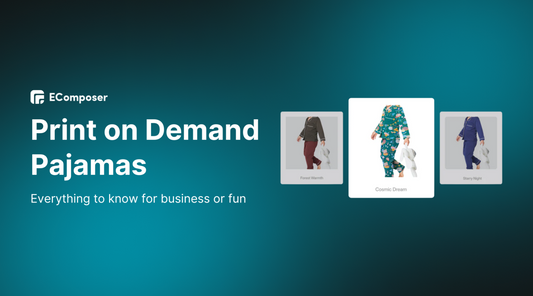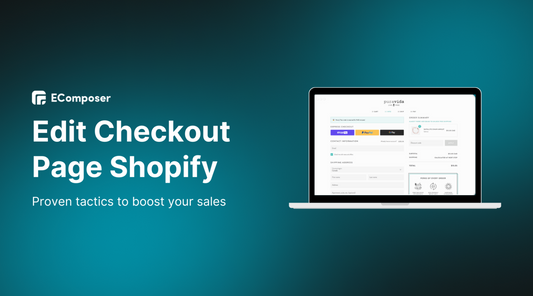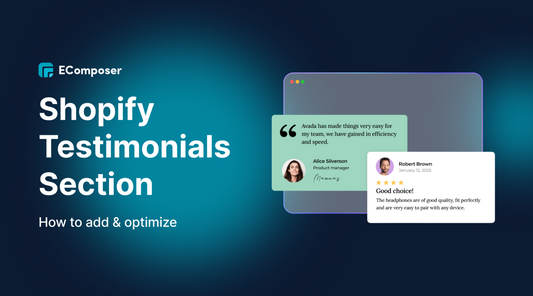How to create a Facebook Ads Landing Pages: Tips & Examples

Table Of Contents
In the fast-paced world of online marketing, the success of your Facebook ad campaigns often hinges on a critical component: your landing pages. A well-crafted Facebook Ads landing page has the potential to significantly boost your conversion rates, turning ad clicks into valuable actions such as purchases, sign-ups, or downloads.
In this blog, we will explore the vital role that Facebook Ads landing pages play in driving impressive conversions. We will provide you with tips and a guide on how to create Facebook Ads Landing Page. Whether you're a seasoned marketer looking to optimize your existing landing pages or a beginner seeking guidance on creating effective ones from scratch, this blog has you covered.
Before going into the details, make sure you have built an eCommerce store on Shopify!
What is Facebook Ads Landing Page?

A Shopify Facebook Ads Landing Page refers to a dedicated web page on a Shopify store that is specifically designed and optimized to receive traffic from Facebook advertising campaigns. It serves as the destination where users are directed after clicking on a Facebook ad.
These landing pages are tailored to align with the messaging and offers presented in the Facebook ad, creating a cohesive and seamless user experience. The goal of a Shopify Facebook Ads Landing Page is to capture the attention of visitors, engage them with compelling content, and ultimately drive conversions or desired actions, such as making a purchase, signing up for a newsletter, or filling out a form.
By creating dedicated landing pages for Facebook ads, Shopify merchants can enhance the effectiveness of their advertising campaigns, improve conversion rates, and maximize the return on their ad spend.
Why do you need Facebook Ads Landing Page?

Having a dedicated Facebook Landing Page can be beneficial for several reasons. Let's break down and analyze each idea:
Targeted Messaging
A Facebook Landing Page allows you to align your messaging with the specific Facebook ad campaign you are running. By tailoring your landing page content to match the ad's message and offer, you provide a seamless and consistent experience for users. This targeted messaging helps in capturing their attention and reinforcing the ad's value proposition.
Enhanced User Experience
A dedicated landing page provides a focused and distraction-free environment for visitors. Unlike directing users to your main website, a landing page removes unnecessary navigation menus or links that could divert attention away from the desired action. This streamlined experience reduces friction and increases the likelihood of conversions.
According to SmarterHQ, 72% of customers only interact with tailored messages; therefore, effectively targeting your Facebook landing page might increase the efficacy of your advertising campaign.
Conversion Optimization
Facebook Landing Pages are designed to optimize conversions. You can strategically place persuasive elements, such as compelling headlines, engaging visuals, customer testimonials, or limited-time offers, to drive users toward taking the desired action. By eliminating clutter and providing a clear call-to-action, you can improve conversion rates and maximize the effectiveness of your Facebook ad campaigns.
Simply adapting your calls to action (CTAs) to your desired group, for example, may have a significant impact, with tailored directives converting 202% higher than generic ones.
Tracking and Analytics
Landing pages enable you to track and measure the performance of your Facebook ad campaigns more effectively. You can implement conversion tracking pixels or integrate with analytics tools to gather data on user behavior, engagement, and conversion rates. This data provides valuable insights for optimizing your ad campaigns and refining your targeting strategies.
Audience Segmentation and Personalization
With Facebook's advanced targeting options, you can create specific ad campaigns tailored to different audience segments. By directing each segment to a customized landing page, you can personalize the content to match their interests, preferences, or demographic characteristics. This personalization creates a more relevant and engaging experience, increasing the chances of conversion.
You can use Google Analytics to track the performance of each landing page. Then, using critical analytics, you can determine what works and what doesn't, and make adjustments for better results.
A/B Testing and Optimization
Facebook Landing Pages provide an ideal environment for conducting A/B tests. You can experiment with different versions of the landing page, testing various elements such as headlines, images, layouts, or CTAs. By analyzing the results, you can identify the most effective combinations and continuously optimize your landing page to improve conversions over time.
How to Create an Facebook Ads Landing Page?
EComposer Landing Page Builder, offers unparalleled versatility within Shopify. With EComposer, you have the flexibility to construct a wide array of page types for your website, including landing pages, homepages, product pages, collection pages, about us pages, contact us pages, policy pages, and more. What sets EComposer apart is its user-friendly interface that allows for seamless customization of various templates, eliminating the need for coding. By drag-and-drop editor, you can effortlessly design and position content to suit your preferences and create stunning web pages that resonate with your audience.
In addition to its extensive website-building capabilities, EComposer shines in its ability to create Facebook Ads landing pages. As a powerful Shopify landing page builder, EComposer empowers you to craft dedicated landing pages that align with your Facebook ad campaigns. Its intuitive drag-and-drop functionality makes it a breeze to customize and optimize your landing pages specifically for Facebook Ads.
Step 1: Sign up for your Shopify account
- If you don't already own a Shopify store, you need to get Shopify trial
- Log in to your online store using your registered email and password.

Step 2: Install and open EComposer - Landing Page Builder
- In the Shopify App Store, search Landing Page Builder then click Add App
- To activate the use of the app, Install the app to your Shopify store.

- In the Dashboard menu, go to Apps, click EComposer Landing Page Builder.

Step 3: Define the purpose and start building your Facebook Ads Landing Page
Your landing page should effectively complement your ad and contribute to achieving your marketing goals. If your objective is lead generation, consider including a newsletter registration box and a compelling call to action to entice email subscriptions. If your aim is conversion, provide a detailed product description and create a sense of urgency.
Ensure that your landing pages align seamlessly with your Facebook ad campaign. Any discrepancies in information between your ad and landing page may raise concerns about your business. Avoid placing a newsletter signup form in the middle of your landing page after advertising a product on a Facebook ad. Visual consistency is also crucial as it creates a strong initial impression and reinforces your brand identity for a lasting impact.
Once you've determined your goal, start building your Landing page:
- Click Start Building in the right corner of the dashboard and select Landing Page.

- Choose any EComposer template you want or click Blank Template if you want to create your own landing page.

- Then, click Setup page info and select Start Building.

Step 4: Customize your Facebook Ads Landing Page
* Option 1: Using EComposer’s prebuilt templates
- Hover over each section of the template, and an editing pen appears, click on it to open the editing section on the left.

- You can change the text in the Content section, adjust the colors or images in the Design section, or customize everything related to display settings like code, background, animation, and more. in the Advanced section.

- Additionally, you can add more elements to your landing page using EComposer.

* Option 2: Using EComposer’s elements to build from scratch
- First, choose a structure you want.

- Select the elements by drag-drop them into the desired location.

- Customize in the Content, Design, and Advanced sections as in the first option.

Step 5: Save and publish your Facebook Ads Landing Page
Once you're satisfied with your edits, click Save and publish to live your landing page. If you don't want to go live, EComposer gives you many other options including Save as draft, Save to library, File import and Export as file.

Step 6: Upload your Landing page to Facebook Ads Manager
Once you are content with your landing page ad, save it and transition to the Ad Manager. The process in Ad Manager is straightforward, especially if you have prior experience creating ads. Select the desired ad type and proceed to complete the various fields, filling in the necessary information.
8 Must-have Tips for Facebook Ads Landing Page

Creating an effective Facebook Ads landing page is crucial for maximizing conversions and achieving campaign success. To help you optimize your landing page strategy, we have compiled a list of 8 must-have tips. These tips cover essential aspects such as clear and concise titles, eye-catching CTAs, attractive content, optimized design, trust indicators, and ongoing testing. By implementing these tips, you can create a compelling and high-converting Facebook Ads landing page that engages your audience and drives the desired actions. Let's dive into these essential tips to enhance your Facebook advertising efforts.
1. Make the title clear and concise
The title of your Facebook Ads landing page should clearly communicate the main benefit or offer in a concise and compelling manner. It should grab the attention of users and make them curious to learn more about your product or service.
2. Design eye-catching CTAs
Your call-to-action (CTA) button should be visually appealing and stand out on the landing page. Use contrasting colors, large and clickable buttons, and persuasive language to encourage users to take the desired action, such as making a purchase or signing up for a newsletter.
3. Create a simple landing page with attractive content
Keep your landing page design clean and uncluttered. Use attractive visuals, concise and persuasive copy, and bullet points to highlight the key features and benefits of your offer. Focus on providing the necessary information without overwhelming the user with excessive details.
4. Create concise and easy-to-use forms
Keep your form fields to a minimum and ask for only the essential information you need from users. Long and complex forms can discourage visitors from completing them. Streamline the form by using smart form fields or progressive profiling to collect additional information over time.
5. Create an optimized Landing Page on all devices
Ensure your landing page is fully optimized for different devices, including desktops, smartphones, and tablets. The page should load quickly, have a responsive design, and provide a seamless user experience across various screen sizes. This ensures that users have a positive experience regardless of the device they're using.
Read more: High Converting Mobile Landing Page
6. Add matching images
Include relevant and visually appealing images that align with your ad and convey the value of your offer. Using an AI image generator can help you quickly create unique, high-quality visuals that capture attention, evoke emotions, and make your landing page more engaging and memorable.
7. Add trust indicators to the Landing Page
Incorporate trust elements such as customer testimonials, reviews, security badges, or industry certifications. These indicators help establish credibility and build trust with users, addressing any concerns they may have about your product or service.
8. Test and optimize your Facebook Ads Landing Page
Continuously test different elements of your landing page, including headlines, CTAs, colors, layouts, and forms. Use A/B testing to compare different variations and analyze data to identify what resonates best with your audience. Regular optimization based on insights will help improve the performance and conversion rate of your Facebook Ads landing page over time.
Examples of Facebook Ads Landing Page
1. Hat Habit

Hat Habit's Facebook Ads Landing Page for their 4th of July campaign aims to drive conversions with its strategic design and persuasive content. The ad content highlights an enticing discount code and amount, creating a sense of urgency and motivating customers to take advantage of the limited-time offer. Upon landing on the product page, visitors are presented with a detailed product description, providing comprehensive information about the featured item, such as the Henschel Original Aussie Breezer hat. Additionally, customer reviews are prominently displayed, serving as strong social proof and building trust among potential buyers.
Overall, Hat Habit's Facebook Ads Landing Page effectively combines persuasive content, informative product details, and visually engaging design to drive conversions and maximize the success of their 4th of July campaign. Ensuring mobile-friendliness and incorporating high-quality product images would further enhance the impact of the landing page, capturing the attention and interest of potential buyers.
2. DTC Newsletter

DTC Newsletter's Facebook Ads Landing Page aims to generate leads by highlighting the values of the initiative and showcasing measurable benefits and testimonials from key brands. The page's design features a consistent color code and highly interactive images, creating a visually appealing and engaging experience for visitors. By combining persuasive content with visually stimulating elements, DTC Newsletter successfully encourages users to enter their email and become part of their community.
Based on the description, the strategy of emphasizing values and providing social proof through testimonials is effective in driving lead generation. To maximize the success of the landing page, it's important to ensure mobile-friendliness, intuitive user experience, and clear calls to action.
3. Rehabu

Rehabu's Facebook Ads Landing Page is strategically designed to drive conversions for their flash sale campaign. The page's content and design work together to create a sense of urgency and capitalize on the fear of missing out (FOMO) effect. The sales-driven copies prominently feature the discount and limited timeframe, enticing visitors to take immediate action. In addition, the hero banner and countdown timer further amplify the urgency, compelling users to make a purchase before time runs out. The combination of persuasive content and visually engaging elements makes the landing page highly effective in driving conversions during the flash sale.
Based on the description, the strategy of creating a sense of urgency and utilizing FOMO effects is well-suited for a flash sale campaign. It's important to ensure that the landing page is optimized for mobile devices, as many users access websites through their smartphones. Additionally, clear and concise calls-to-action should be prominently displayed to guide visitors towards making a purchase. Incorporating high-quality product images and customer testimonials could further enhance the landing page's effectiveness in driving conversions.
Final thoughts
In conclusion, creating effective Facebook Ads landing pages is crucial for driving impressive conversions. By following the creation guide and implementing the valuable tips discussed in this blog, you have the potential to optimize your ad campaigns and achieve remarkable results. Remember to focus on attention-grabbing headlines, persuasive calls-to-action, mobile optimization, trust-building elements, and continuous testing. As you refine your landing pages and analyze the data, you'll be able to make informed decisions and improve your campaign performance. Get ready to take your Facebook advertising to new heights and unlock the full potential of your conversions.
If you want more information or want to learn more about EComposer, follow us at ecomposer.io or click on the message icon located in the right corner of the screen.
=================























0 comments